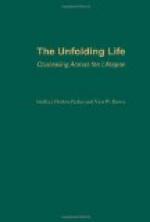The little child is at first in a world of total mystery. Sights, sounds, sensations from contact come to him and all are unintelligible. As they are carried to his brain, somewhere, somehow, they awaken a desire to know their meaning, and as the tiny fingers are extended toward objects the soul is reaching also. This soul reaching is curiosity, one of God’s most gracious and wonderful provisions for the life, but so often its significance is misunderstood. If there were no curiosity, there would never be any eager attempt to explore the field of knowledge. The disciplined spirit of inquiry that makes for the world’s progress, is only a fuller development of the untutored and disastrous effort of the child to find out about things. We forget that before there can be a flower there must be a bud. Before there can be a scientist who shall pick the rock to pieces to learn its secret, there must be a child who picks a doll to pieces to see what is inside. The pathos of childhood is its bowed head and mute lips under the blow and the stinging word, because judgment is passed, not on motives, as the parent demands for himself, but on the external appearance of the act. We look into our Heavenly Father’s face, out of the wreckage and mistakes of a day, and say, “I meant to do it aright, but I am so ignorant,” and we are comforted that He looks at the heart and understands. Can we be less pitifully tender toward His little ones?
There are three marked manifestations of curiosity during this period of childhood.
(1) Questions.
In the wordless years of earliest life, mysteries around the child can receive only partial solution. But the day comes when language gives him a key whereby to unlock the doors, and he begins to ask, “What is it,” then “Why,” and “Where,” and “How.” This questioning period commences about the age of three, and is in strong evidence for some time. The answers involve for the most part nouns and verbs, not adjectives nor adverbs, signifying that the child is not yet ready for abstract qualities and characteristics. Simple facts only are sought at first. Questions concern the names of things, activities connected with them, causes and ends and the age-long mystery of origins.
Passing by reluctantly any further discussion of this most fascinating subject of children’s questions, four great facts bearing upon nurture must be noted.
1. Repression of the sincere questioning of a child tends to weaken his effort to acquire knowledge.
2. Questions reveal a need felt by the child, and are a guide to the kind of instruction he is ready to receive.
3. A question not only reveals a need, but is also an assurance that the instruction given will be received, for what the mind wants to learn, it will learn.
4. A sincere question demands a sincere answer.
This statement would seem superfluous, if its need were not apparent in questions dealing with the origin of life. God gives to the mother, first, the sacred privilege of investing these most holy mysteries with purity and sanctity, and through this confidence drawing the life of the child into closer fellowship with her own. If the opportunity be cast away through the evasive or untruthful answer, the facts may come with a taint upon them which can never be wholly removed.




